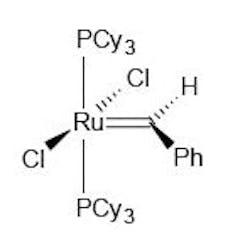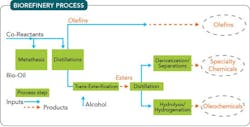Biorefinery Makes Better Building Blocks
Across a wide variety of global markets, leading manufacturers today are looking for high-performance specialty chemicals with improved sustainability profiles. Elevance Renewable Sciences is helping to address these market needs right now through its next-generation biorefinery technology that uses locally available renewable feedstocks to make specialty chemicals that can enable the manufacturers to offer products that exceed the performance of existing ones.
At its biorefinery, Elevance is producing novel products that function as chemical building blocks and deliver category-changing performance. These products are helping the industry move beyond petrochemicals to something that is better, a new generation of chemistry with a smaller environmental footprint.
Elevance uses a patented, Nobel-Prize-winning metathesis catalyst technology to transform renewable feedstocks such as palm oil into novel high-performing ester, olefin and triglyceride molecules and multi-functional polymers — a new category of products we call Renewicals — for use in a variety of markets. With catalytic metathesis, the synthesis routes are shorter, resulting in greater output as well as cleaner and more environmentally friendly production.
This unique process has allowed the company to scale up production easily at high yields and with commercially compelling economics.
Highly Efficient Catalysts
In olefin metathesis, the carbons attached with a double bond change places with other alkene carbons — enabling new chemical compounds and manufacturing processes previously impossible that offer compelling economics. The olefin metathesis catalyst technology used by Elevance is based on the work of Nobel Laureates Richard R. Schrock and Robert H. Grubbs.
Figure 1. This highly effective metathesis catalyst, developed by Grubbs, is easy to synthesize. (ph=phenyl and Cy=cyklohexyl).
Traditionally, metathesis only had been used with hydrocarbons in a high-pressure, high-temperature process. The real breakthrough came with the discovery of highly efficient metathesis catalysts that could handle complex plant oils as feedstocks to make new materials such as unsaturated methyl esters and olefins at industrial scale at low temperatures and pressures and, thus, with attractive economics.
A number of chemists made major contributions to the development of metathesis catalysts and their applications. However, Schrock and Grubbs and their coworkers have achieved crucial progress in this area.
Schrock’s first practicable catalysts. Schrock started research on new alkylidene complexes in the early 1970s. He gradually developed an understanding of which metals could be used in the catalysts and how they functioned. He identified molybdenum and tungsten as the most suitable metals, and produced some catalysts with those metals. However, there still was uncertainty as to what groups would bind to the metal to give stable, yet active, alkylidene complexes. A breakthrough came in 1990 when Schrock and coworkers reported the preparation of a group of very active well-defined molybdenum catalysts.
With this discovery, chemists began to realize that olefin metathesis could serve general purposes in organic synthesis. Metathesis gained increasing attention among researchers active in synthetic chemistry. It turned out that metathesis can replace a number of traditional synthesis methods. At the same time, it permits entirely new approaches to the synthesis of organic molecules. Molybdenum catalysts often are sensitive to oxygen and water, but with the right treatment, are very powerful tools in organic synthesis.
General catalysts developed by Grubbs. Yet another breakthrough in the development of metathesis catalysts came in 1992 when Grubbs and his coworkers published their discovery of a catalyst with the metal ruthenium. It was stable in air and demonstrated higher selectivity but lower reactivity than Schrock’s catalysts. The new catalyst also could initiate metathesis in the presence of alcohols, water and carboxyl acids. Grubbs continued to improve his catalysts. Figure 1 depicts the structure of one of his effective metathesis catalysts that are easy to synthesize.
Grubbs’ ruthenium catalysts have become the first well-defined ones for general metathesis applications and have given rise to uses in organic synthesis. Grubbs has continued developing ruthenium-based metathesis catalysts into even more powerful tools for synthesis, including that of polymers with special properties.
The Commercial Process
Elevance’s manufacturing platform (Figure 2) implements metathesis technology in novel combinations with established industrial processes (e.g., transesterification, hydrogenation and distillation) to create an integrated biorefinery capable of making both specialty chemicals and renewable, petroleum-based alternatives. Our biorefinery converts the triglycerides and fatty acids found in natural oils (such as plant, vegetable and algal oils) into multiple value-added chemical streams.
The heart of the process is proprietary olefin metathesis technology that operates at low temperature and pressure while being efficient, stable and predictable. The metathesis unit consists of three stages stacked in series — each having a continuously stirred tank reactor — designed by Elevance specifically for the equilibrium reaction and to operate in a temperature range of 55–65°C and a pressure range of 10–12 barg. The co-reactants along with the catalyst are fed into the lower portion of the first reactor and flow upward until exiting the top of the third and final reactor.
Downstream from the metathesis reaction, traditional chemical operations convert, separate and further purify the biorefinery products. Distillation separates the olefins from the metathesized triglyceride. Short-chain (
Figure 2. The technology can handle a host of natural oils and manufacture a variety of high-performance products.
The biorefinery has broad feedstock flexibility. It can use a variety of renewable oils but favors those with high degrees of unsaturation (because metathesis operates on the carbon-carbon double bonds found at the points of unsaturation). Possible feedstocks include palm, mustard, soybean, canola and, when they become commercially available, jatropha or algal oils. These feedstocks can be sourced locally, enabling Elevance and its customers to reduce their carbon footprint across the entire supply chain. For example, the existing biorefinery in Gresik, Indonesia, takes advantage of palm oil available locally, while the Natchez, Miss., facility currently under construction will rely upon soy and canola oils as primary feedstocks. As in a traditional petroleum refinery, the biorefinery’s operating conditions are adjusted for specific feedstock oil composition, resulting in different relative proportions of the end products. This allows the biorefinery to vary, within some limits, the production distribution to maximize the economics of the total product suite.
Elevance’s technology offers major advantages to the market today, providing companies with unique unsaturated ester and renewable olefin building blocks to develop new molecules and product lines. For example, in the personal care and cleaning markets, the technology produces a range of olefins that can serve as drop-in renewable alternatives to petroleum-based materials (e.g., alkanes and polyalphaolefins). It also offers novel di-functional (olefin/ester) building blocks that provide unique physical and performance characteristics as routes to new, high-performing products and ingredients that meet market needs (e.g., low-VOC, high-performing degreasers and cold water detergent boosters).
Compelling Advantages
Similar to petroleum-based refineries, our biorefinery produces multiple high-value chemicals. However, its metathesis-catalyst-based low-pressure, low-temperature process consumes significantly less energy and reduces greenhouse gas emissions by 50% compared to petrochemical technologies. Highly efficient, selective metathesis catalyst is used to break down natural oils and recombine fragments, resulting in a process with lower source pollution, production costs and capital expenditures than petrochemical refineries.
The manufacturing pathway enables significant savings on scale-up. The stills and reactors require relatively modest capital expenditures compared to those needed for the massive chemical facilities used in traditional petrochemical production. Retrofitting or repurposing existing biodiesel and oleochemical plants can afford even greater cost efficiency.
Elevance and Wilmar International Ltd. formed a joint venture that now operates the first world-scale biorefinery based on our proprietary metathesis technology (see photo). This commercial-scale facility in Gresik, Indonesia, which began supplying products in July 2013, has an annual capacity of 180,000 metric tons (approximately 400 million pounds) of products, with the ability to expand up to 360,000 metric tons (approximately 800 million pounds).
In Natchez, Miss., Elevance is in the midst of a multi-phase project to convert an existing biodiesel facility into the second world-scale biorefinery and derivatives facility. The Natchez facility will have a capacity of 310,000 metric tons (approximately 680 million pounds) per year.
Elevance also is further advancing its technology by developing and scaling-up new olefin metathesis catalysts. In early 2014, the company signed a memorandum of understanding with Versalis to develop the technology to establish the first world-scale ethylene metathesis plant using renewable oils at Versalis’ site in Porto Marghera, Italy.
Elevance biorefineries will make the same end products and are capable of running on multiple renewable oil feedstocks. The biorefineries produce renewable building blocks, including C10+ alpha and internal olefins, as well as high-value, di-functional specialty chemicals, such as 9-decenoic acid methyl ester, with superior functional attributes that previously were unavailable commercially. These di-functional molecules combine the attributes of an olefin, typical of petrochemicals, and a mono-functional ester or acid, typical of bio-based oleochemicals, into a single molecule. The biorefineries also produce a premium mixture of oleochemicals.
The high-value performance specialty chemicals, olefins and oleochemicals made at the biorefineries will benefit a variety of markets. Elevance already has commercialized some of the first Renewicals:
• Inherent line of renewable building blocks;
• Elevance Smooth and Elevance Soft personal care ingredients;
• Elevance Aria WTP-40 base stock and Elevance Concert GC-350 additive for the lubricant industry; and
• Elevance Clean 1200 degreasing and VOC-exempt solvent.
The Future Is Now
Our olefin metathesis technology and Renewicals afford companies the opportunity to take advantage of new chemical building blocks and ingredients to expand their portfolios with high-performance products, reduce their environmental footprint, and meet critical industry needs and trends.
SCOTT BAXTER is director, strategic asset development, for Elevance Renewable Sciences, Woodridge, Ill. ANDY SHAFER is executive vice president, sales and marketing, for Elevance in Woodridge. E-mail them at [email protected] and [email protected].


